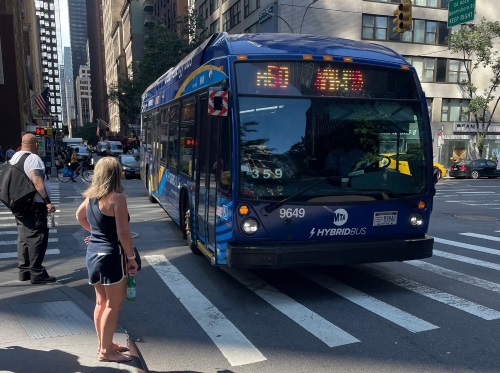The Federal Transit Administration recently issued more than $1.6 billion in grants to transit agencies, territories, and states across the country to invest in 150 bus fleets and facilities.
[Above photo by the MTA]
Funded by the $1.2 trillion Infrastructure Investment and Jobs Act or IIJA enacted in November 2021, that funding should nearly double the number of no-emission transit buses on America’s roadways, according to an FTA statement.
The agency added that, for the first time, 5 percent of that low- and no-emission bus funding would go towards training transit workers on how to maintain and operate clean bus technology.
FTA is providing those bus grant awards through two programs. The first is its Low or No Emission (Low-No) Grant Program, which makes funding available to help transit agencies buy or lease U.S.-built low- or no-emission vehicles, including related equipment or facilities.
The IIJA provides $5.5 billion over five years for the Low-No Program – more than six times greater than the previous five years of funding, FTA said. For fiscal year 2022, approximately $1.17 billion is available for grants under this program.
The second is FTA’s Grants for Buses and Bus Facilities Program, which supports transit agencies in buying and rehabilitating buses and vans and building bus maintenance facilities. The IIJA provides nearly $2 billion over five years for the program, the agency said. For fiscal year 2022, approximately $550 million for grants was available under this program.
Several state departments of transportation received grants via this round of awards (for a full list of the projects receiving grants, click here). Those include:
- The Alaska Department of Transportation, on behalf of the City and Borough of Juneau and Capital Transit, received $2.3 million to rehabilitate and modernize its vehicle storage and maintenance facility.
- The Connecticut Department of Transportation received just over $20 million on behalf of the Connecticut Southeast Area Transit District to rehabilitate its Preston transit facility, buy battery electric buses, and launch a training program to help staff operate and maintain zero-emission buses.
- The Colorado Department of Transportation received $51 million to support a variety of projects, including $34.7 million on behalf of Summit Stage, a rural transit agency that provides bus service in Summit, Park and Lake Counties in northeast Colorado, to build a bus depot for electrical charging and storage. It will replace Summit Stage’s aging facility and prepare for a 100-percent electric fleet in the future.
- The District of Columbia Department of Transportation is getting $9.6 million to help buy battery-electric buses to replace diesel vehicles and increase the size of the Washington, D.C., Circulator fleet.
- The Hawaii Department of Transportation gets $23.2 million on behalf of Hawaii, Kauai, and Maui counties to buy a mix of zero-emission buses, battery electric buses, and fuel cell electric buses. The agency is also getting a further $12 million to undertake bus stop and facility improvements.
- The Iowa Department of Transportation gets $15.8 million for one urban and four rural transit agencies to buy battery electric buses and charging equipment. The agency gets a further $12 million to buy new buses, cutaway chassis, and vans to replace older vehicles for 26 of Iowa’s transit systems.
- The Massachusetts Department of Transportation gets $4.1 million on behalf of Martha’s Vineyard Transit Authority and Nantucket Regional Transit Authority will receive funding to buy battery electric and propane buses to replace older diesel vehicles.
- The Minnesota Department of Transportation gets $3.4 million to buy battery electric buses and charging equipment to replace buses that are part of four rural transit fleets.
- The New Mexico Department of Transportation gets $3 million on behalf of the South Central Regional Transit District to buy battery electric buses and charging equipment, provide training and buy property it currently leases. It also gets another $2.5 million on behalf of the South Central Regional Transit District to buy battery electric buses and charging equipment as well as fund staff training.
- The Oregon Department of Transportation gets $4.6 million to buy battery electric buses and install three new electric chargers. It gets an additional $2 million for the Sandy Area Metro to buy battery electric buses and install charging equipment, replacing diesel buses that have exceeded their useful life.
- The South Dakota Department of Transportation gets over $1 million on behalf of River Cities Public Transit, Community Transit of Watertown/Sisseton, Prairie Hills Transit, and Rural Office of Community Services to buy low-emission propane buses, two propane conversion kits, and install a propane fueling station.
- The Tennessee Department of Transportation gets $12 million on behalf of two urban and five rural transit agencies to buy buses and demand-response vehicles to replace older vehicles that reached their useful life.
- The Utah Department of Transportation gets over $6 million on behalf of Park City Transit to buy battery-electric buses and charging equipment to expand its express route service in the Quinn’s Junction area.
- The Vermont Agency of Transportation gets $9.1 million to buy electric buses and install charging equipment for Marble Valley Regional Transit District in Rutland and Green Mountain Transit in Burlington. VTrans gets a further $3.2 million to build a bus depot for the Marble Valley Regional Transit District.
- The Washington State Department of Transportation gets $5.4 million to purchase vehicles for three rural transportation providers, replacing buses that have exceeded their useful life, improving quality of life, and reducing greenhouse gas emissions.

